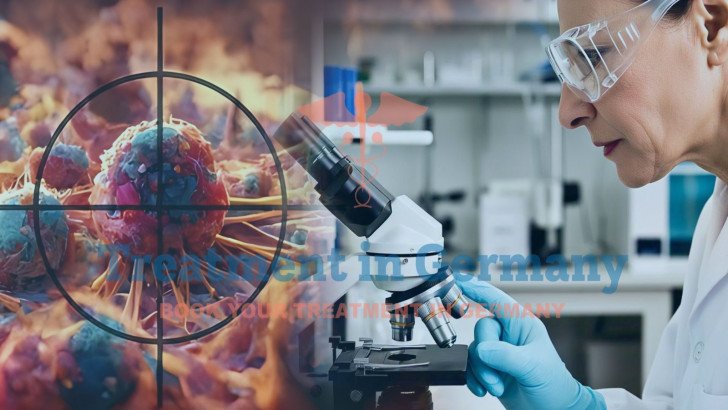
Dendritic cells are antigen-presenting cells (APCs) essential for triggering T cell responses. They capture antigens from pathogens or tumor cells and process them into smaller fragments.
Targeted therapy for cancer and dendritic cell therapy are transforming cancer treatment in Germany, offering precise, personalized approaches to fight cancer. While targeted therapy attacks specific cancer cell traits, dendritic cell therapy, an advanced immunotherapy, boosts the immune system to destroy tumors. Together, they represent innovative cancer treatments, providing hope for patients with cancers like breast, lung, and leukemia. Germany’s world-class healthcare system, supported by skilled doctors, oncologists, and specialists, ensures effective care.
Targeted therapy uses drugs or treatments to attack specific molecules or pathways that cancer cells need to grow, sparing healthy tissues. Dendritic cell therapy, a form of immunotherapy, enhances this by training the immune system to recognize and eliminate cancer cells. In this therapy, dendritic cells—the immune system’s coordinators—are extracted from a patient’s blood, exposed to cancer antigens in a lab, and reinjected to activate T-cells against tumors.
This dual approach is ideal for cancers resistant to traditional treatments like chemotherapy, addressing health factors such as obesity, diabetes, high cholesterol (hyperlipidemia), and autoimmune diseases. Hospitals leverage latest research in cancer treatment to deliver these therapies, improving quality of life after treatment in Germany.
Dendritic cell therapy works synergistically with targeted therapy through a structured process:
German oncologists monitor outcomes using CT scans or MRI, ensuring precision. Targeted therapy, such as trastuzumab for HER2-positive breast cancer, complements this by blocking cancer growth signals, while dendritic cells clear residual tumors. This outpatient therapy, requiring few sessions, is combined with other immunotherapy for maximum impact, supporting cancer treatment.
Why Dendritic Cell Therapy is Key to Targeted Therapy for Cancer
Targeted therapy alone can slow cancer growth, but resistance often develops. Dendritic cell therapy addresses this by engaging the immune system for a lasting response. Doctors prefer this combination for:
Hospitals integrate these into cancer treatment options, tailoring plans to improve quality of life after treatment, based on latest research in cancer treatment.
Cancers Treated with Dendritic Cell Therapy and Targeted Therapy
The combination of dendritic cell therapy and targeted therapy is effective for various cancers, particularly those with specific molecular targets or resistance to standard treatments. Hospitals use it for:
German value this approach for its adaptability, making it a cornerstone of cancer therapy in Germany.
Benefits of Combining Dendritic Cell Therapy with Targeted Therapy
This integrated approach offers significant advantages:
Side effects, such as mild flu-like symptoms from dendritic cells or fatigue from targeted drugs, are minimal and managed by doctors. Hospitals ensure patient comfort through careful monitoring.
Integrating with Other Cancer Treatments
Dendritic cell therapy and targeted therapy are often combined with other cancer treatment options for optimal results:
This comprehensive approach, supported by latest research, maximizes treatment success and supports quality of life after treatment.
Complementary Therapies Supporting Treatment
Complementary therapies enhance the effectiveness of dendritic cell therapy and targeted therapy:
These therapies are a standard part of cancer therapy ensuring well-rounded care in hospitals.
Why Germany Leads in Dendritic Cell Therapy and Targeted Therapy
Germany is a global leader in cancer treatment in Germany, offering unique advantages for these therapies:
Germany’s patient-focused care makes it an ideal destination for dendritic cell therapy and targeted therapy.
Conclusion
Targeted therapy, combined with dendritic cell therapy, is reshaping the future of cancer treatment, offering precise, effective solutions for cancers like breast, lung, and leukemia. Integrated with immunotherapy and complementary therapies, these therapies provide personalized cancer treatment options. With experienced German oncologists and state-of-the-art hospitals, patients receive care that enhances quality of life after treatment.
FAQs
Which hospitals offer dendritic cell therapy and targeted therapy for cancer in Germany?
Many hospitals in Germany and specialized cancer clinics provide dendritic cell therapy and targeted therapy, delivered by experienced specialists.
How much does dendritic cell therapy and targeted therapy for cancer cost in Germany?
The cost of cancer treatment in Germany for these therapies depends on the treatment plan and facility.
Can dendritic cell therapy and targeted therapy cure cancer in Germany?
They can lead to remission in early cancers or control advanced cases, improving quality of life after treatment in Germany.
What cancers are treated with dendritic cell therapy and targeted therapy in Germany?
Breast, lung, leukemia, melanoma, colorectal, and prostate cancers are treated, per latest research in cancer treatment.
Why do doctors choose dendritic cell therapy and targeted therapy for cancer in Germany?
They’re precise, have mild side effects, and work well together.
Are clinical trials available for dendritic cell therapy and targeted therapy in Germany?
Yes, hospitals offer trials for innovative cancer treatments, including these therapies.
How does dendritic cell therapy and targeted therapy in Germany compare to other countries?
Cancer treatment is world-class, with German oncologists using advanced technology and expertise.
How effective are dendritic cell therapy and targeted therapy for cancer in Germany?
They can extend survival and reduce tumors, improving quality of life after treatment.
Are doctors in Germany experienced with dendritic cell therapy and targeted therapy?
Doctors, including German oncologists, are highly skilled in cancer treatment, ensuring expert care.
What is the waiting time for dendritic cell therapy and targeted therapy in Germany?
Treatment typically starts within 1-2 weeks, with priority for cancer patients.
Can I get a cost estimate for dendritic cell therapy and targeted therapy before traveling?
Yes, hospitals in Germany provide cost estimates based on medical records for cancer treatment.
For more information or a free consultation, visit our contact us page.
Kindly complete the form below, and our dedicated team will reach out to you promptly. We look forward to connecting with you soon!
Trierer Straße, 56072 Koblenz, Germany

.webp)
 (1).webp)

.webp)
 (1).webp)


.webp)
 (1).webp)

.webp)
 (1).webp)
